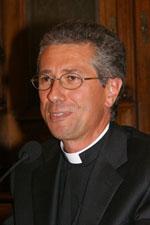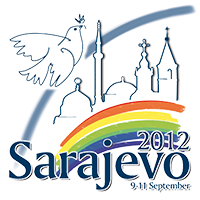
Communauté de Sant’Egidio, Italie
|
On December 8th 1965 Paul VI at the end of the great Second Vatican Council addressed himself to the poor and suffering as follows: “All of you who feel heavily the weight of the cross, …you who are ignored, you the unknown victims of suffering, take courage. You are the preferred children of the kingdom of God, … and with Him, if you wish, you are saving the world. This is the Christian science of suffering, the only one which gives peace.”
In the search for unity among the Christians which finds a solid fundament within this meeting, the awareness of the suffering of humankind and the face of the poor with its evocative has always been there.
In the preface of the Pastoral Constitution on the church in the modern world, Gaudium et Spes, we read: “The joys and the hopes, the griefs and the anxieties of the men of this age, especially those who are poor or in any way afflicted, these are the joys and hopes, the griefs and anxieties of the followers of Christ. Indeed, nothing genuinely human fails to raise an echo in their hearts.”
Is it not our common feeling here in Sarajevo, that our hope for the most wounded of life should be stronger and mightier than death, and brighter, like resurrection? Most of all they search in us, Orthodox, Catholics and Protestants, for the common root in Christ, which we received through baptism. Even before recognizing our different confessions they want to detect our likeness of Him, who has put them in the centre of his existence. Therefore, the love we owe to the poor is not a secondary corollary of our search for communion: it is found in the lymph of the vine of which we are the branches.
His Beatitude Hyeronimos, Orthodox Archbishop of Athens declared on September 2nd: “Contrary to what Jean Paul Sartre stated, the other is not ‘our inferno’. The other is the face of the least of my brothers; he is the place where we meet Christ. Therefore working (with the poor) is theology. It is ‘the ongoing liturgy’, which in this way is manifested on the face of man, as the reflection of Gods face”.
The affirmation that “the poor are those who are ignored. They are the unknown victims of suffering”, as stated in 1965 is valid also today: the poor truly are the “unheard prophets”. The urgency of making the world more humane is written in their flesh. Often their misery is a consequence of the division which is opposed by the Church of Christ, which is a sacrament of the unity of the human family. Their presence, aggravated by the planetary crisis, reminds us of the eschaton, the ultimate need for salvation. It reveals the truth we fear most: I, we, are beggars for grace, for mercy, communion, just like the beggar at our church doors. The mysterious and outrageous inequality we all bear (life expectancy, opportunities given to me and not to other people, health….) is no cold sociological fact to the Christian. It is a mystery we should not obscure and that can only credibly be answered by kenotic love, the love we give for free, that goes as far as the total self-gift. And martyrs of all denominations question our tepidness…
The evangelical bread multiplication at the banks of the Sea of Galilee, also challenges the feeling of impotence of the Christians in our time, as well as the secular world: Jesus’ words “you feed them” are an imperative for us to become instruments of the humble Christian power. I think of the Orthodox Church in the streets of Athens, in these trying months, of bishop Gabriel and the association Apostles , Sant’Egidio is collaborating with today, and we know, as His Beatitude Hyeronimos confirms, that the European crisis is not only financial, but also has spiritual roots.
50 years after the convocation of the second Vatican Council we are still convinced of the importance of the words of Gaudium et Spes. “The Church has always had the duty of scrutinizing the signs of the times and of interpreting them in the light of the Gospel…. We must therefore recognize and understand the world in which we live, its explanations, its longings, and its often dramatic characteristics.”
Today, many decades later, together we can read the signs of the times and perceive the deep currents of history. Together with His Holiness Kirill we have done this with intensity and joy, with special attention for our continent. After 1989 this great church has made charity its own again, after it had been taken away by the soviet communism, which not only persecuted this church until martyrdom, but which also sought to impose a division between liturgy and love for the poor.
I think of the happy and intense relationship with Vladika Pantaleimon, President of the Department of Charity and of our upcoming common projects. From one another we received spiritual wisdom (I think about Metropolit Filaret) studying the force of martyrdom and charity. Recently we organised a conference to discuss the topic of old age. We let the richness of the liturgy of the different traditions speak for itself, the Scriptures and the monastic traditions of the East and the West. Great elderly of the Spirit have been recalled, showing the sources and legacies these “elderly” witnesses such as John Paul II, Patriarch Tichon, Patriarch Athenagoras and Sister Emmanuelle have been able to bequeath. Such is the paradoxical life of Christians. Great churches, with centuries of traditions, have passed through epochal crises, conserving the treasure of faith and fecundating their time. Weakness becomes power in Christ, according to Saint Paul’s axioma.
Weakness itself can make us come closer to one another. I think of the Lutheran Church of Sweden and its archbishop and our friend Kwarme. This church opposed he terrible predication of hate killings that made many innocent victims in Oslo last year July, by the predication of love and strength of the youngsters. We were very moved by his choice to go on a pilgrimage to Rome with countless pastors, to grow deep roots to the love for the poor, together with the Community of Sant’Egidio. This way, the poor, the elect in the Kingdom of God, urge the Churches and the Christians to speak truthfully about the Lords death and resurrection, together recognising Him amongst the least of his brothers.
I think I can read a synergy and a unity between gestures and signs as implemented by their pastors. After sharing Christmas lunch with the poor in Sant’Egidio’s soup kitchen in Rome on December 27th, 2009 Benedict addressed them as follows: “Today here becomes true what happens at home: the difference is no longer clear between who serves and who is being served, between who helps and who is being helped. The first place is reserved for the most needy. With the words of Saint John Chrysostom I would like to remind everyone: “Be aware that you become a priest of Christ, not giving flesh with your own hand, but bread, not blood but a cup of water” (homily on the Gospel according to Matthew, 42,3). When Saint Lorenzo, deacon of the Church of Rome was ordered to hand over the Church treasures, he showed the poor as the true treasure of the Church.
Similarly, His Holiness Kirill desired in the heart of the Holy Week to give a personal gift to the homeless of Moscow, accompanied by a signed letter. In this letter he wrote that they are the heart of the Orthodox Church, and they should feel at home there, because Christ is aware of their need for love and life. This seems to embrace nova et vetera, old and new things, springing from ancient roots.
Saint John of Kronstadt said: “Welcome those who come to you with a friendly and smiling face, whoever they are, even if it is a beggar, most of all if he comes for reasons of faith. Humiliate yourself in front of anyone, knowing that you are the least of all, because Christ himself has chosen you to be the servant of all.” Gregory of Nissa says the same: “Do not despise the poor. Ask yourselves who they are and discover their greatness: they have the face of our Saviour(…). The poor are the administrators of our hope… God loves compassion and sharing. They make the person who lives by these values similar to God…, so he becomes the image of the highest, eternal Being, that surpasses all intelligence. This is the Christian doctrine of suffering, the only kind that brings peace.
Often the anawim, the poor themselves understand this Christian knowledge best. At the end, I would like to give voice to one of them. Her name is Hiresyo and she is 23 years old. She is heavily disabled, but lives an adventure of love, faith and extraordinary culture, together with the movement “degli amici – the friends”. She is unable to speak, but with a special technique (augmentative communication) she typed on the computer:
I could think about the world with immense horizons, but without peace the horizon is dark.
I could be healthy but without love I would be ill in spirit.
I was able to overcome limits, because being loved they have given me unimaginable opportunities.
Limits are imposed by those who do not try to love.
|

